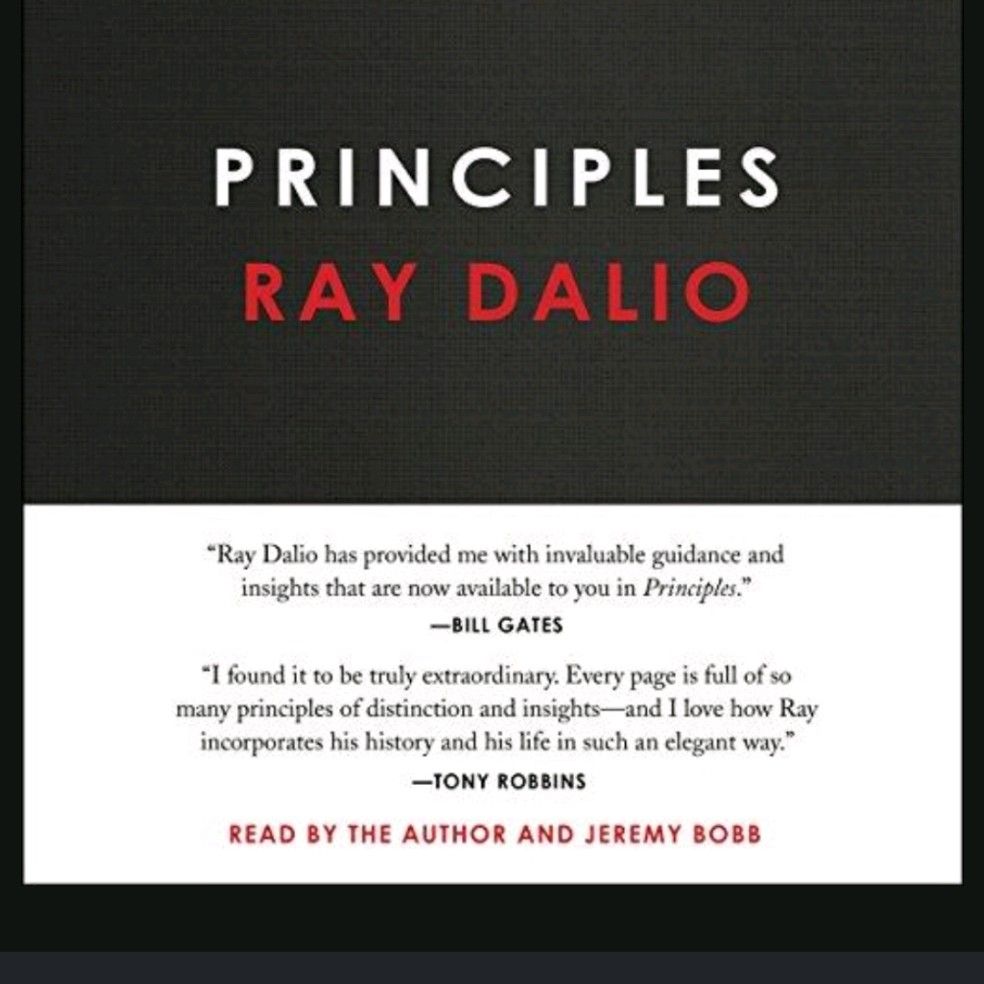
It’s a common “They Say” that in order to be a great person, you must have principles in your life. The thing is, a life principle doesn’t mean what most people think it does.
A Principle is defined as “a fundamental truth or proposition that serves as the foundation for a system of belief or behavior or for a chain of reasoning.”
For most people, this is viewed as some sort of moral code.
Don’t steal.
Don’t kill.
Follow the Golden rule.
All are good things, but they’re almost passive guidelines.
In my belief, a sound life principle should not only inform behavior when you come to a decision, but it should also provide an active direction to go. It’s not just a do/don’t thing but instead a guiding light to follow.

The great investor and author Ray Dalio, as the founder of Bridgewater Associates, a top tier investment management company, published a book “Principles”, in which he goes over the fundamental operating principles of Bridgewater.
The book is phenomenal. It’s a perennial best-seller for a reason.
The advice he gives within it through his (and Bridgewater’s by extension) life principles is valuable.
However, I don’t think that’s REALLY where the golden nugget is to be had.
The real value was the discussion of creating YOUR OWN personal principles for life.
As simple formula is to:
- Accept the situation you’re in and view it as a learning opportunity.
- Analyze it.
- Distill those findings into repeatable “rules”.
- Use those rules to create your own principles.
With that in mind, here’s five principles I’ve put together for my own life as well as teaching to my Spiral of Leaders members.

Imagine that you were playing in a football game.
Now, imagine that you didn’t know:
- Where you were on the field.
- Which goal you were trying to score in.
- What position you were playing.
- What down it was.
- What time was on the clock.
- What the score was.
What do you think would be the likelihood of you winning that game?
Pretty slim.
You wouldn’t play a football game that way, but that’s how most people go through life. They have a vague “big goal”, like winning the game, but don’t have any idea of what that actually looks like, where they are now, or what the road to get from point A to B is going to entail.
There’s a few that make it, for sure.
They’re the exceptions. Most people fall far short of their dream life.
One of the first things I have new clients figure out is what their life is like now. At face value that sounds simple – Of course you know what your life is like, right? You’re living it.
However, how often do you really take stock of things and measure what you can?
- How’s your physical shape? Physique, health, performance, etc.
- How’s the financial shape? Income, net worth, debt, etc.
- How’s your relationships situation? Romantic, friendship, family, etc.
- How’s your day to day life? Stress, achievement, enjoyment?
You can slice it up further, but once you’ve got some of this stuff out of the “general idea” ether and on paper in front of you most likely there are gaps that you’ve been avoiding or have simply slipped your observation.
Next, take a look at where you want to go. This can be long-term or in the relative short-term. I find it useful for myself and clients to set an “end goal” that is a little more flexible/vague in a lot of qualities and then tighter short-term objectives.
Define what you can:
“I want to be healthy and rich in the next ten years” is pretty useless, honestly. Nobody else knows what that means, and what it means to YOU can be fleshed out. Without a clear direction your brain will almost always choose to do as little as possible.
“I want to maintain a 34” waist and stay under 220 lbs because I feel best there and have $5 million invested in ten years” gives us more to work with.
Now that you have a couple of end points, it’s time to connect them.
This is where your shorter-term strategies come in.
It can be daunting to look from now to ten years, and quite frankly not that useful. In ten years time your goals will often change (42 year-old Isaac has different priorities than 32 year-old Isaac and DRASTICALLY different views than Isaac at 22) as well as the path might be pretty murky.
However, from where you are now you can generally see the next logical step. This is the short-term objective. Maybe it’s four-eight-twelve weeks as opposed to ten years.
We humans have a hard time really conceptualizing more than three months or so in the future and sticking to a single grind for more than that time is tough, as well. So make use of that as a feature, not a bug.
Find something to focus on that gets you moving in the direction you’re looking to go in for a bit. When you accomplish that, likely the next step and any course corrections you need to take will have revealed themselves.
Principle #2 – Create the best You possible.

We’re part of a tremendously complex collection of complex systems.
Step back and think about your life for a second. Even if you wouldn’t consider it all that exciting or unique, the number of variables at play on a daily basis are staggering.
In your work system you have every process that you go through, every coworker or employee, every customer and piece of equipment, and more.
Go home and you’ve got your family, the pet, the leaky faucet in the kitchen, the trash that needs to go out (not too early, though, because of the raccoons living behind the garage), and everything else going on.
Then there’s you, yourself – Your metabolism, skin, nervous system, etc are all complex systems.
From your skin cells to the global economy, we’re all connected to a wide variety of systems.
Do we need to stress about all of that? Probably not.
But what it does mean is that there’s a lot of things that are outside your control.
Things will happen that you saw or did not see coming. Even if you live a pretty mundane life there will still be situations where you’ll have to make a choice on how to best react.
The idea of being able to be in full control of your life, in the face of that evidence, is laughable at best.
Here’s what you can do.
We could go on and on about risk mitigation or anti-fragile strategies but let’s reserve those for another time. Instead, here’s where everyone should start:
Build yourself into the best version of You that handles those variables as well as possible.
Being the best version of You allows you to not only flex with what life throws at you but also to take advantage of the opportunities. In business it’s easy to see where this can apply, but in life it can open up so many more possibilities, as well.
For example, a friend has invited me to go climb a particular mountain that I’d always wanted to do. There’ve been times in my life where I wasn’t in the shape to where I’d feel good doing that and would have probably turned them down. That would be a missed opportunity because I wasn’t prepared.
You don’t need to try to max out every category – Peak shape, business master, best spouse ever, parent of the year, and world-class bonzai artist. That would be an exercise in spinning the wheels.
Instead, seek to minimize the deficits in the big areas and lean into your strengths where you’re more inclined.
Here’s what I mean:
I think we can all agree you are going to be hindered if you’re operating out of a deficit in your general health/fitness, financial knowledge, ability to communicate, and stress management.
Getting to at least a “pretty good” level in all of those will translate to a much happier, healthier life.
Where you’d go hard is where you’re strong or you want particular outcomes. Let’s say you are a decent salesperson and you work in the high-offer world. Well, even if you’re already pretty good then it might behoove you to become even better.
Principle #3 – Everyone is a leader.

Leadership is one of the most confused buzzwords that you see flung around today.
Everyone talks about good leadership but it seems to mean different things to different people.
Lead (verb) – “To be in charge or command of” – Google Dictionary
To be fair, the definition of “lead” and “leadership” leave a lot open to interpretation. However, it does point out a frequently overlooked component:
We’re ALL leaders in some capacity.
We may be leaders at our jobs, on our teams, or in our homes, or we may not. One place we’re all a leader is in our own lives. Ultimately, you’re responsible for your own life and what happens in it.
In my mind, a true leader must be responsible for three things:
- Establish clarity of targeted outcome.
- Set a clear path towards that outcome.
- Make adjustments as necessary to continue progress towards the outcome or change course as needed.
If a leader can do those things consistently, then that will result in long-term success.
People can quibble over the details, but I think everything that encompasses a “good leader” fits in those buckets.
It’s also where self-leadership starts.
For your own life, if you can’t do those three things, then you’re going to struggle. If you can’t do those three things consistently, you’ll certainly struggle to get a greater group of people or larger organization to pull them off consistently.
Principle #4 – Build or Acquire Assets.

When most people hear the term “asset” they think of investments like stocks or real estate. Those are certainly assets.
However, the broader definition of an asset is “a useful or valuable thing, person, or quality”.
An asset is basically anything that you can hold that maintains or builds value. This goes far beyond the aforementioned financial vehicles. It can include skills you’ve acquired, relationships built, and even (or especially) your basic health.
Life provides us many opportunities to chase transitory pleasures, items, or experiences. It’s fine to enjoy things and seek pleasure. That’s part of the human experience.
For many people that is their primary operating directive.
They seek pleasurable food at the moment.
They chase status items like cars, watches, or the latest phone.
They opt for a quick or basic vacation.
Again, all of those are fine. But they don’t build your asset base and that will eventually keep you limited.
Building your assets over time has a two-fold means of helping you reach your goals.
On one side of the equation, assets have the power to accumulate more assets or other things. If you’re sitting on a big mountain of investments or have an extensive network of friendships, then your ability to buy something new or get the hook-up somewhere is much higher. This translates to an easier time doing what you want to do, when you want to do it, and enjoying life much more along the way.
The second benefit of intentionally building a big asset base is increased security in troubled times. Again, whether it’s financial, network, or health and skills, those with something of value are always going to weather storms better than those who don’t.
Principle #5 – What got you here won’t get you there.

This is a favorite quote of one of my biggest mentors, Paul.
Our brain loves things to stay the same. Remember, the brain’s primary objective is to keep us alive and safe. The more change and uncertainty you bring into that mix, the less happy it is.
So for the vast majority of us, if left to our own devices we’ll seek to make things as similar day to day as we can. This is subconscious.
Let’s say you’re at a medium level of success. Decent job, no big stress at home, good house, do the occasional BBQ or catch a game with your buddies, and so on. Life is pretty good.
But you want more. You want to work for yourself, move from “decent” to wealthy, have exciting experiences and vacations, and provide at a high level for your kids. Whatever “more” means for you.
Most people never really get their “more”.
Why?
Because they keep doing the things that got them “decent”. The brain is comfortable with that and doesn’t want to rock the boat by increasing the risk that it perceives doing new things to be.
The truth is, though, that your current life, for better or worse, is a direct result of your behaviors and reactions. In order to have a different experience in the future, you’ll need to grow to different behaviors and reactions. This could be a significant change or it could be a relatively minor one, but the bottom line is that what got you here won’t get you there.
Ultimately, you’ll need to come up with your own life principles. Your view on the world, circumstances, and goals are likely to be different than mine. The important thing is that you do develop these principles and codify them for yourself.
As Socrates said – “The unexamined life is one not worth living“.
Want some more exclusive observations from my in the trenches coaching with the Spiral of Leaders members? Be sure to join the Insights list and they’ll come right to your inbox.
